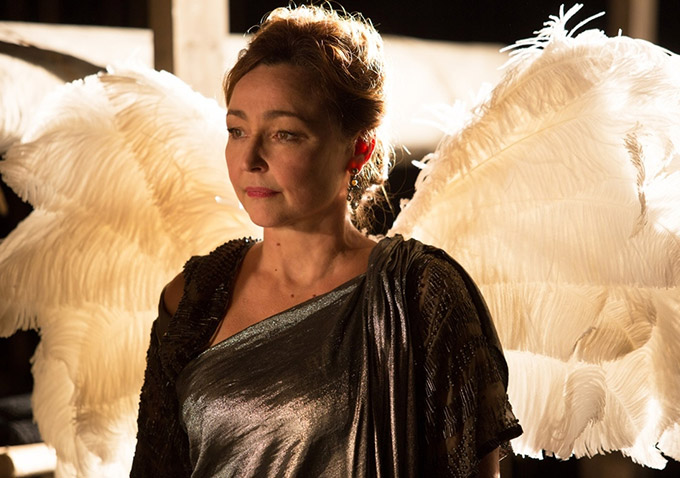Biopics and historical films almost exclusively center on subjects who did something exemplary or were talented at their pursuits. But what sets “Marguerite” apart is its focus on a woman whose most notable feature is her utter lack of talent. Thus, it’s not without some irony that this French farce earned four César Awards wins and eleven nominations, including a statuette for its truly gifted leading lady Catherine Frot.
Very loosely inspired by a true story (and one that is the basis for the upcoming Meryl Streep film “Florence Foster Jenkins”), “Marguerite” stars Frot as Marguerite Dumont, a rich heiress in 1920s France whose love for the opera far outweighs her skill at singing it. With an excess of wealth, Marguerite suffers not only from a utter void of pitch and tone, but also a dearth of people who will tell her the truth about her voice. At first, she performs only at small charity concerts she sponsors close to her home outside Paris, earning praise from aristocratic attendees who snicker behind her back.
“Marguerite” does an excellent job sharing exactly how terrible its titular singer is. Early in the film, the audience is treated to two lovely sopranos singing Léo Delibes‘ “Flower Duet" from the opera “Lakmé,” prepping the uninitiated for how beautiful the genre can sound. As a contrast, Marguerite’s performance of “Der Hölle Rache” from Mozart’s "Die Zauberflöte" immediately follows, all croaks and squawks. This is a shock to young but talented Hazel (Christa Théret), one of the sopranos who just performed. Marguerite’s husband Georges (André Marcon) is often mysteriously absent from her performances, showing up just after she has finished mangling another aria. Meanwhile, her butler Madelbos (Denis Mpunga) does his best to shield her from those who might be candid about her terrible performances, and he takes photos of her in costume with elaborate props.
The private nature of her singing threatens to change when two men sneak into one of her closed performances. Critic Lucien Beaumont (Sylvain Dieuaide) and his anarchic poet friend Kyrill Von Priest (Aubert Fenoy) want to share Marguerite’s singing with the larger Parisian society, each with different motives, and they convince her to do a recital in the city. Has-been opera singer Atos Pezzini (Michel Fau) joins her crew to ostensibly train her for a big upcoming performance, with his own entourage in tow. At each stage of the film, her husband Georges tries to keep her from performing for her sake (as well as his own), while others scheme to give her opportunities to sing in front of more and more people who will be less likely to be a kind audience.
In the title role, Frot fully embraces her character’s lack of talent and obliviousness, earning the audience’s sympathy even as we laugh at her singing. Her eyes communicate Marguerite’s joy and deep sadness; the loneliness she feels at her husband’s lack of attention permeates the performance. Her singing also deserves special mention: Marguerite’s voice is a combination of Frot’s and another singer, and it’s perfectly seamless — and perfectly awful. Gabriel Hafner and François Musy deservedly earned a César for their sound work.
In addition to its César wins and nominations above the line and for sound, “Marguerite” further distinguishes itself behind the scenes and earned recognition for its efforts. The cinematography from Glynn Speeckaert is lush, with a largely neutral and gold-toned palette. Color, particularly reds and greens, occasionally slashes into the frame to add depth or punctuation. Pierre-Jean Larroque’s costumes are perfectly detailed, with stunning beadwork, elaborate hats and plush furs. The production design — particularly in Marguerite and Georges’ home — nicely communicates both the 1920s French setting and the couple’s wealth. Cyril Nakache’s editing ably captures both Marguerite’s screeching and her audience’s reactions, as well as a training montage that nicely mimics those in films with more talented subjects.
This is director Xavier Giannoli’s first period film, but it plays as an interesting counterpoint to his 2006 movie “The Singer (Quand j’étais chanteur).” In that romantic drama, Gérard Depardieu stars as a talented local singer who sees his limited fame fading. The director’s 2012 comedy “Superstar” also addresses similar themes, with Kad Merad playing an average man who becomes unexpectedly and undeservedly famous. By contrast, the protagonist of “Marguerite” lacks talent and only approaches infamy. The film walks a fine line as it pokes fun at its protagonist while celebrating her passion and spirit. Its tone seesaws between elegance and farce, though it’s never over the top. Character motivations are complex, with Marguerite’s husband, teacher and butler never having an easily explainable approach tom dealing with the amateur singer in their lives. This isn’t a simple film, which is largely to its credit.
However, at 127 minutes, Giannoli’s script feels overlong and a bit repetitive in its heroine’s disastrous performances. Lucien, the critic who helps propel Marguerite and her story forward, disappears for a large chunk of the film, only to randomly appear toward the end. Other than these missteps, “Marguerite” is worth watching with a well-earned grimace, largely for Frot’s pitch-perfect performance. [B]

